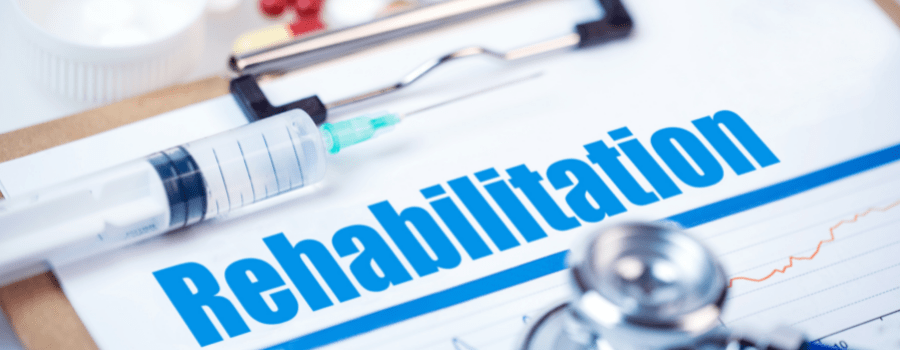You may have heard of rehabilitation centres referenced on television and in movies, but how much do you know about rehabilitation services and the types of treatment that they provide? In this article, we’re going to define precisely what a rehab centre is, outline the rehabilitation process, and share an example or two of the different types of rehabilitation facilities and their clinical purposes.

Rehabilitation centre definition
The official definition of the word ‘rehabilitation‘ is: the action of restoring someone to health or normal life through training and therapy after imprisonment, addiction, or illness.
The broader definition of a rehab centre can include people who have suffered brain injury, people who have been injured resulting in various disabilities (e.g., physical therapy), and any other types of trauma that has resulted in a person being unable to live their lives as before the incident.
A person will spend time in therapy and undergoing various treatments and therapies until they can carry out everyday activities unassisted. Depending on the patient’s condition, intensive care may be required.
In this case however, we are referring to drug and alcohol rehabilitation facilities. As such, a drug rehab centre is a clinic that provides rehabilitation services, medical treatment, and psychiatric care in order to assist an individual in identifying the root cause of their addiction, come to terms with any underlying mental health issues that may have led to their addiction, and working on ways to cope with the symptoms of withdrawal with the ultimate goal of recovery through prolonged sobriety.
Types of rehabilitation centres
No two rehabilitation centres are created equal and the scope and quality of services provided can vary significantly. Let’s take a look a the different types of rehab centres.
Residential rehabilitation centres
Residential rehab centres refers to facilities that offer inpatient rehab services. By inpatient it means that an individual is treated as a resident of the facility from anywhere between 30 and 90-days (sometimes longer depending on the facility and severity of the addiction).
- NHS-funded: NHS-funded facilities can refer to a hospital with a rehab centre or a public-funded facility where patients can join rehabilitation programmes for free (or partially funded). Availability varies from city to city and the level of care offered can differ significantly from that offered in private institutions.
- Private: Private rehab centres are private facilities that provide rehabilitation services to individuals who are in a position to pay for their treatment. Typically speaking, the level of care and attention provided in a private rehab centre is far superior to that in an NHS-funded hospital. As well-intentioned as public funded drug and alcohol rehabilitation programmes are, private institutions almost always have better medication, treatments plans, amenities, and staff – not to mention a far shorter wait time. (sometimes it can take years for a person to receive the proper care they need in a public rehab centre).
Depending on the quality and type, inside these residential facilities there will be a number of private rooms available (sometimes shared rooms and bunks), doctors and medical facilities, and various other rooms for occupational therapists to work, support groups to meet, and patients to relax and enjoy some normal daily activities, etc.
Outpatient rehabilitation centres
Outpatient rehab centres are very different to inpatient or ‘residential’ rehabs. Outpatient provides a less restrictive programme and usually only require 10 to 12 hours a week, rather than the patient having to leave their homes and family to reside permanently for weeks and often months at a time.
The outpatient sessions focus on drug abuse education, while providing individual and group counselling alongside them. It’s about educating those who are addicted on how to better cope with life absent the drug they have been abusing.
An outpatient drug rehab and treatment plan is ideal for those who may have a mild addiction and are seeking more information. Alternatively, it can be used as part of a long-term treatment programme lasting from 3 to 6-months and sometimes over a year.
Some individuals prefer outpatient rehab because it allows them to remain with their loved ones and continue working to support their family members.
What treatments do rehabilitation centres provide?
The treatments offered by rehab centres varies from place to place. Not only that, but typically, a rehab centre will tailor the treatment plan to the individual – often involving a mixed-bag of the following treatments:
- Hospital rehab
- Inpatient treatment
- Outpatient treatment
- Detoxification
- Cognitive behavioural therapy
- Rational emotive behaviour therapy
- Contingency management
- 12-step programmes
- Medication
How to find a rehabilitation centre near you
Depending on your situation, finding a rehabilitation centre near you should be straight forward enough. First, speak with a close friend of family member about the nature of your addiction and let them know that you are in need of help and support. Following that, you can reach out to an addiction specialist to seek further advice. They can ask you questions about the severity of your addiction, find out more about your unique situation, and advise you accordingly.
For the best possible treatment and care, we strongly advise seeking out advice and treatment from a private rehab facility. That way you can avoid any unnecessary waiting lists, receive superior treatment, and have the greatest chance at successful recovery from your addiction.
We hope that you have found this article helpful and wish you the very best of luck.







